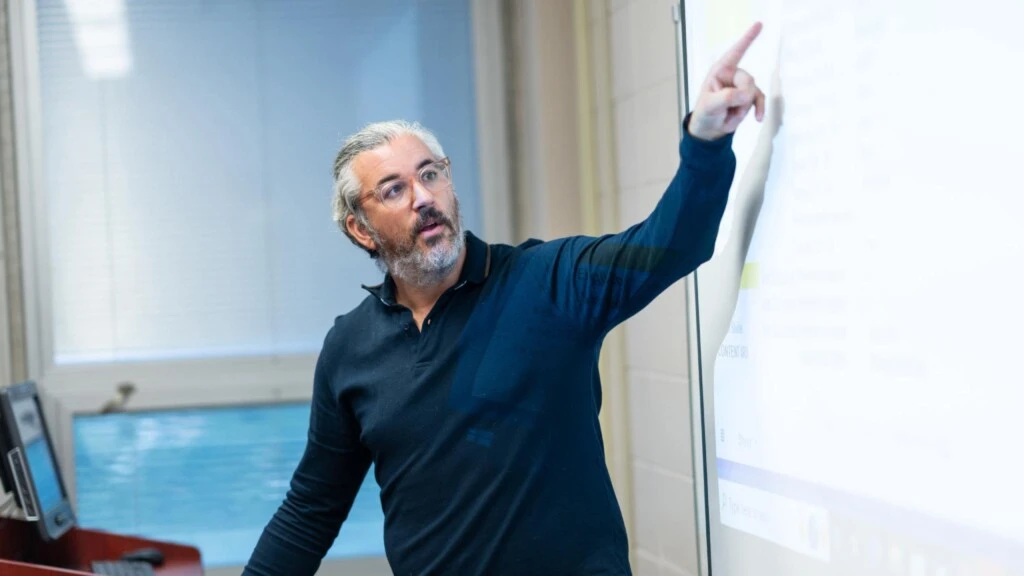
- Degree Level
- Graduate
- Degrees Offered
- Master of Education, PA Certification
- school/college
- School of Education
Graduate Programs in Secondary Education
While seeking certification in secondary areas, you can attain a master’s degree. This program prepares college graduates and working professionals with state teaching certification within chosen areas – biology, chemistry, english, general science, mathematics, or social studies.
The degree is not required for certification. An Arcadia advisor will help you plan your path to certification for both the certifications and master’s program. Undergraduate students may pair their respective disciplinary major—Biology, Chemistry, General Science, English, Mathematics and Social Studies—with a specialized education minor and certification.
Customize Your Program
This flexible master’s program allows you to:
- Earn certification part- or full-time, with evening classes and online course options.
- Complete multiple certification areas, with or without master’s degree.
- Choose how many courses to register for each semester with the help of your academic adviser.
- Ensure that degree and/or certification requirements are satisfied.
Scholarships
The School of Education offers a limited number of scholarships each year to exemplary applicants based on their merit and commitment to being a change agent in education. These awards range from $4,000 to $5,000, spread out over two years. Prospective students can apply for scholarships by completing an optional scholarship essay within the online application. Applicants to the Master of Education (MEd) and Doctor of Education (EdD) are eligible to apply.
Certification Areas
View individual areas to learn more about specializations and for specific certification requirements:
Featured Courses
Cultural Foundations of Education
Required Course
Examine the ways in which educational institutions and the teachers within them structure learning experiences for various students depending in part on their interpretations of these students' "differences." Educators must be aware of issues that may arise due to at least two factors:
- Differences between teachers' and students' backgrounds
- How aspects of identity are framed and understood by teachers, parents, students and school administrators
Issues in Science for Secondary Teachers
Required Course, for science certifications
Learn a wide variety of instructional techniques and materials to facilitate science learning in the secondary classroom and laboratory settings. This course addresses controversial issues, safety in the laboratory and storage areas, meeting the needs of diverse students, use of technology in the classroom, integration of environmental and social issues and a variety of other issues relevant to the secondary school setting.
Public History
Required Course, for social studies certification
In one of the few programs in the country to require this course, you will explore the history that belongs to the public—history that is seen, heard, read, and interpreted by popular audiences. You will work with cultural institutions, National History Day (NHD) program, and/or public schools to help shape public history. This cours develops both historical and educational skills through field experiences, readings, class discussions, and projects.
ESL: Teaching Multilingual and Multicultural Literacies
Required Course
Focus on the academic language needed for multilingual students to be successful in U.S. schools. You will spend time investigating reading and writing standards and curricula for students in a particular context and the ways that materials might be adapted for English Language Learners (ELLs) and ELLs with disabilities.
Learning and Assessment in Secondary Mathematics
Required Course, for mathematics certifications
This course is an examination of Social Studies curriculum resources and methodology with an emphasis on applications for classroom teaching at the 7–12 level.
School of Education Graduate Program Information
Teacher Certification Agreements
Pennsylvania has signed the NASDTEC Interstate Agreement that provides for acceptance of state-approved educator preparation programs between certain states to facilitate educator mobility.
Admission Requirements
For working professionals seeking graduate degrees or certifications, we offer full-time, part-time, online and options to build your own degree.
Tuition and Fees
Learn more about the cost differences for part- and full-time students and any specialized School of Education program costs.


